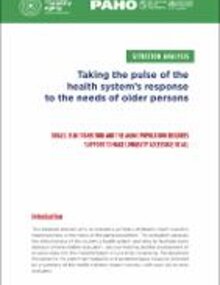This situational analysis aims to present a summary of Brazil’s health system's responsiveness to the needs of its aging population. This evaluation assesses the effectiveness of the country’s health system through available tracer indicators and aims to facilitate an open dialogue towards further evaluation, decision-making, and the development of an action plan with the implementation of cost-effective policies. Brazil has more than 30 million older persons aged 60 years and older, which represents 13% of the country's population. By 2030, this age group will reach approximately 50 million, representing 24% of the total Brazilian population. Brazil is among the 10 countries in the Region of the Americas with the largest population of older people who constitute the main users of the public health system in Brazil. The population aged 60 years and older is projected to continue to increase during the next 25 years. By 2030, there will be around 10 million more older people than children (0-14 years). This situation represents a challenge to the health system and the requirement of adaptation and design of adequate health responses. The Decade of Healthy Aging (2021-2030) encourages countries to adopt the necessary actions to face this situation and to produce data and investigations to inform public policy decisions. In this sense, this document first presents Brazil’s current demographic and epidemiological situation, followed by the main summary of its health system responsiveness, based on the model of health systems monitoring proposed by PAHO to achieve universal care.
|

